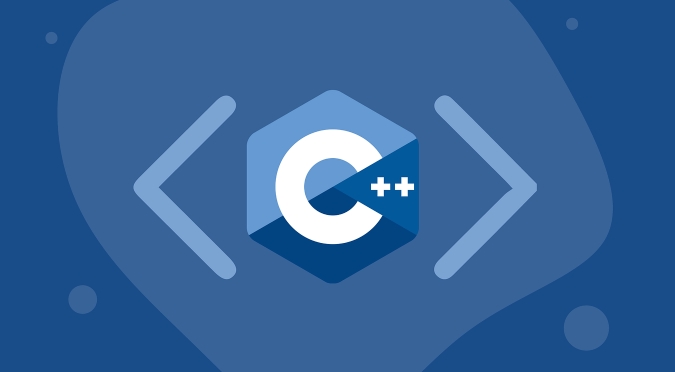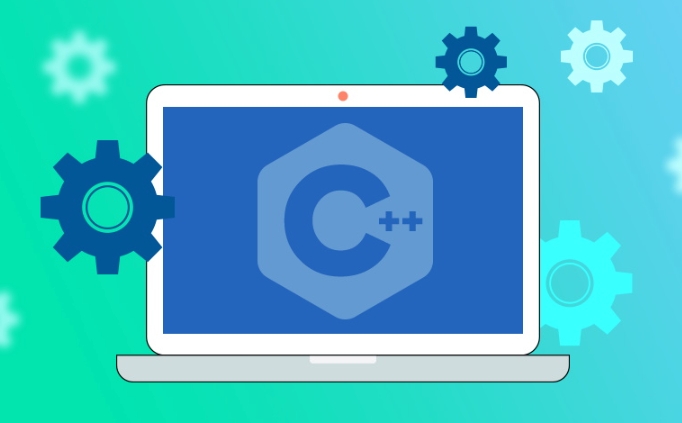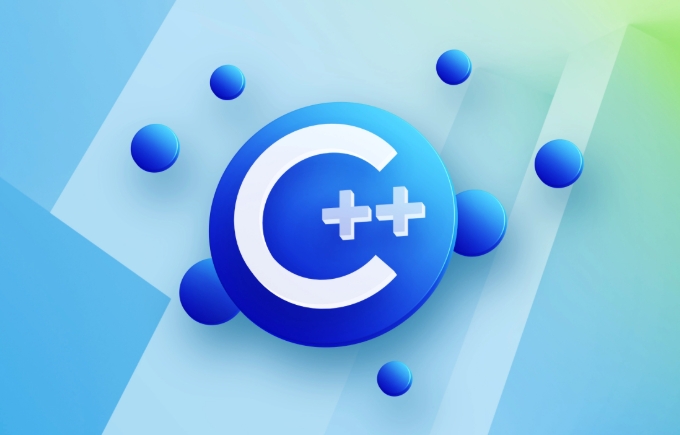extern "C" is used to solve the linking problem when C calls C functions. 1. Use #ifdef __cplusplus to wrap extern "C" in the header file to ensure that the C compiler does not modify the name, and the C compiler can handle it normally; 2. The C implementation file is written in standard C syntax, and the target file is compiled and generated; 3. The main C program contains the header file and calls the function. When compiling, use g to link the target files of C and C, and finally successfully call the C function and output the result. Therefore, as long as the extern "C" protection function declaration is used correctly, a mixed compilation and link between C and C can be achieved.

extern "C" comes in handy when you call functions written in C code, or if you hope that the C code can call C functions. Its main function is to tell the C compiler: this part of the code uses the linkage method of C and does not modify the name of C.

Here is a simple extern "C" example showing how to call C functions in C.
? Project structure
. ├── hello.c // C implementation file ├── hello.h // C header file ├── main.cpp // C main program
1. hello.h —— C function declaration (with extern "C" protection)
// hello.h
#ifndef HELLO_H
#define HELLO_H
#ifdef __cplusplus
extern "C" {
#endif
void says_hello();
#ifdef __cplusplus
}
#endif
#endif // HELLO_H? illustrate:

-
#ifdef __cplusplusis to let the C compiler know that this is a C environment. - The
extern "C"block only takes effect when C compiles, and the C compiler ignores it. - This way of writing can ensure that this header file can be used both by C and C.
2. hello.c —— C function implementation
// hello.c
#include <stdio.h>
#include "hello.h"
void says_hello() {
printf("Hello from C!\n");
} ? This is a standard C function. When compiling, C compiler (such as gcc ) is used. The function name is say_hello in the symbol table.
3. main.cpp ——C calls C function
// main.cpp
#include "hello.h"
int main() {
say_hello(); // Call the C function return 0;
} ? Because the statement say_hello() is wrapped in extern "C" in hello.h , the C compiler will not name mangling this function name, and the linker can find the say_hello symbol generated by C compile.

? Compile and link
You need to compile the C and C files separately and then link them together:
gcc -c hello.c -o hello.o # Compile the C file g main.cpp hello.o -o main # Use g to link C and C target files
run:
./main # Output: Hello from C!
?Why do you need extern "C"?
C supports function overloading, so the compiler will modify the function name (name mangling), such as:
-
void func()may become_Z4funcv -
void func(int)may become_Z4funci
The C compiler will not modify the name, func is func .
If you call a C function directly in C but do not add extern "C" , C will look for the modified name, and the link error occurred: undefined reference to 'say_hello' (actually the name does not match).
? Summary: Key points for using extern "C"
- Used to call C functions in C code, or let C call C functions (the latter requires additional processing).
- Wrap it in the header file with
#ifdef __cplusplusto ensure compatibility. - It only affects the link method and does not affect the syntax.
- Commonly found in system libraries and dynamic libraries (such as
.so/.dll) interfaces.
Basically that's it. Just remember: C adjusts C, add extern "C" protection to the header file, use the C compiler to compile the C file during compilation, and just link it with g .
The above is the detailed content of C extern 'C' example. For more information, please follow other related articles on the PHP Chinese website!

Hot AI Tools

Undress AI Tool
Undress images for free

Undresser.AI Undress
AI-powered app for creating realistic nude photos

AI Clothes Remover
Online AI tool for removing clothes from photos.

Clothoff.io
AI clothes remover

Video Face Swap
Swap faces in any video effortlessly with our completely free AI face swap tool!

Hot Article

Hot Tools

Notepad++7.3.1
Easy-to-use and free code editor

SublimeText3 Chinese version
Chinese version, very easy to use

Zend Studio 13.0.1
Powerful PHP integrated development environment

Dreamweaver CS6
Visual web development tools

SublimeText3 Mac version
God-level code editing software (SublimeText3)
 Using std::chrono in C
Jul 15, 2025 am 01:30 AM
Using std::chrono in C
Jul 15, 2025 am 01:30 AM
std::chrono is used in C to process time, including obtaining the current time, measuring execution time, operation time point and duration, and formatting analysis time. 1. Use std::chrono::system_clock::now() to obtain the current time, which can be converted into a readable string, but the system clock may not be monotonous; 2. Use std::chrono::steady_clock to measure the execution time to ensure monotony, and convert it into milliseconds, seconds and other units through duration_cast; 3. Time point (time_point) and duration (duration) can be interoperable, but attention should be paid to unit compatibility and clock epoch (epoch)
 What is the volatile keyword in C ?
Jul 04, 2025 am 01:09 AM
What is the volatile keyword in C ?
Jul 04, 2025 am 01:09 AM
volatile tells the compiler that the value of the variable may change at any time, preventing the compiler from optimizing access. 1. Used for hardware registers, signal handlers, or shared variables between threads (but modern C recommends std::atomic). 2. Each access is directly read and write memory instead of cached to registers. 3. It does not provide atomicity or thread safety, and only ensures that the compiler does not optimize read and write. 4. Constantly, the two are sometimes used in combination to represent read-only but externally modifyable variables. 5. It cannot replace mutexes or atomic operations, and excessive use will affect performance.
 How to get a stack trace in C ?
Jul 07, 2025 am 01:41 AM
How to get a stack trace in C ?
Jul 07, 2025 am 01:41 AM
There are mainly the following methods to obtain stack traces in C: 1. Use backtrace and backtrace_symbols functions on Linux platform. By including obtaining the call stack and printing symbol information, the -rdynamic parameter needs to be added when compiling; 2. Use CaptureStackBackTrace function on Windows platform, and you need to link DbgHelp.lib and rely on PDB file to parse the function name; 3. Use third-party libraries such as GoogleBreakpad or Boost.Stacktrace to cross-platform and simplify stack capture operations; 4. In exception handling, combine the above methods to automatically output stack information in catch blocks
 What is a POD (Plain Old Data) type in C ?
Jul 12, 2025 am 02:15 AM
What is a POD (Plain Old Data) type in C ?
Jul 12, 2025 am 02:15 AM
In C, the POD (PlainOldData) type refers to a type with a simple structure and compatible with C language data processing. It needs to meet two conditions: it has ordinary copy semantics, which can be copied by memcpy; it has a standard layout and the memory structure is predictable. Specific requirements include: all non-static members are public, no user-defined constructors or destructors, no virtual functions or base classes, and all non-static members themselves are PODs. For example structPoint{intx;inty;} is POD. Its uses include binary I/O, C interoperability, performance optimization, etc. You can check whether the type is POD through std::is_pod, but it is recommended to use std::is_trivia after C 11.
 How to call Python from C ?
Jul 08, 2025 am 12:40 AM
How to call Python from C ?
Jul 08, 2025 am 12:40 AM
To call Python code in C, you must first initialize the interpreter, and then you can achieve interaction by executing strings, files, or calling specific functions. 1. Initialize the interpreter with Py_Initialize() and close it with Py_Finalize(); 2. Execute string code or PyRun_SimpleFile with PyRun_SimpleFile; 3. Import modules through PyImport_ImportModule, get the function through PyObject_GetAttrString, construct parameters of Py_BuildValue, call the function and process return
 What is function hiding in C ?
Jul 05, 2025 am 01:44 AM
What is function hiding in C ?
Jul 05, 2025 am 01:44 AM
FunctionhidinginC occurswhenaderivedclassdefinesafunctionwiththesamenameasabaseclassfunction,makingthebaseversioninaccessiblethroughthederivedclass.Thishappenswhenthebasefunctionisn’tvirtualorsignaturesdon’tmatchforoverriding,andnousingdeclarationis
 How to pass a function as a parameter in C ?
Jul 12, 2025 am 01:34 AM
How to pass a function as a parameter in C ?
Jul 12, 2025 am 01:34 AM
In C, there are three main ways to pass functions as parameters: using function pointers, std::function and Lambda expressions, and template generics. 1. Function pointers are the most basic method, suitable for simple scenarios or C interface compatible, but poor readability; 2. Std::function combined with Lambda expressions is a recommended method in modern C, supporting a variety of callable objects and being type-safe; 3. Template generic methods are the most flexible, suitable for library code or general logic, but may increase the compilation time and code volume. Lambdas that capture the context must be passed through std::function or template and cannot be converted directly into function pointers.
 What is a null pointer in C ?
Jul 09, 2025 am 02:38 AM
What is a null pointer in C ?
Jul 09, 2025 am 02:38 AM
AnullpointerinC isaspecialvalueindicatingthatapointerdoesnotpointtoanyvalidmemorylocation,anditisusedtosafelymanageandcheckpointersbeforedereferencing.1.BeforeC 11,0orNULLwasused,butnownullptrispreferredforclarityandtypesafety.2.Usingnullpointershe






